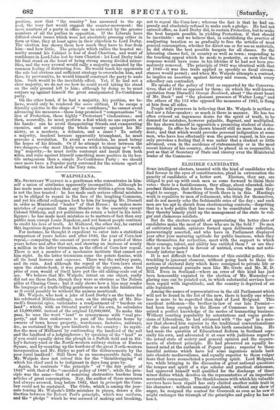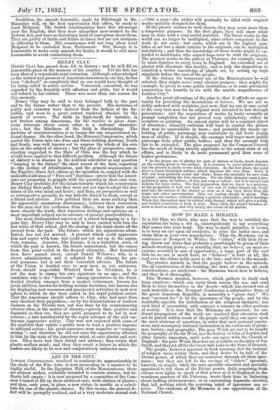ELIGIBLE CANDIDATES.
SOME intelligent electors, taunted with the kind of candidates who find favour in the eyes of constituencies, plead in extenuation the paucity of candidates of a better sort. Electors, they say, are obliged to put up with such men as come forward to claim their votes : there is a fastidiousness, they allege, about educated, inde- pendent thinkers, that deters them from claiming the posts they ought to occupy. Something of truth there is in this. Hustings work is repulsive to men of refinement, who think for themselves, and do not merely echo the fashionable cries of the day ; and such men are too apt to shrink from electioneering contests,—forgetting that in a body politic that has come to be constituted as ours is, they thereby tamely yield up the management of the state to vul- gar and clamorous smolists.
But do the electors capable of appreciating the better class of candidates make the most of those who are in the field ? Do men of cultivated minds opinions formed upon deliberate reflection, perseveringly asserted, and who have in Parliament displayed year after year maturing aptitude for public business, when they offer themselves for reelection, meet with the support to which their courage, talent, and ability has entitled them ? or are they not apt to be rejected in favour of untried, even when not noto- riously inferior men ? It is not difficult to find instances of this suicidal policy, this truckling to ignorant clamour, without going back to those de- sertions of electoral duty which have consigned to private life or purely professional pursuits men like Mr. Grote and Mr. M. D. Hill. Even in Scotland—where an error of this kind has just been honourably expiated in the election of Mr. Macaulay—a glaring case can be pointed out, in which substantial services have been repaid with ingratitude, and the country is deprived of an able legislator.
Among the names of representatives in the old Parliament which will not be found in the list of the new, there is hardly one whose loss is more to be regretted than that of Lord Melgund. This excellent nobleman—the brother-in-law of our late Premier— had been long enough in the House of Commons to have ac- quired a perfect knowledge of its modes of transacting business. Without courting popularity by ostentatious and vague profes- sions of Liberalism, he had advanced with "the age " in a man- lier that showed him superior to the traditional conventionalisms of the class and party with which his birth associated him. He had made the question of Educational Reform in Scotland espe- cially his own, and advocated it at once with judicious regard to the actual state of society and general opinion and the require- ments of abstract principle. He had preserved an equally ba- lanced mind at the outbreak of Popery panic ; superior to those fanciful notions which have led some ingenious minds back into obsolete medicevalisms' and equally superior to those vulgar fears that have resuscitated a persecuting spirit. Lord Melgund, too, while bringing to the discussion of great national questions the temper and spirit of a ripe scholar and practical statesman, had approved himself well qualified for the discharge. of those minor duties which devolve on the representative of an important mercantile community. The thanklessness with which his valuable services have been repaid has only elicited another noble trait in his character : without unmanly complaint, without any show of anger, he resigned the contest for Greenock as soon as he saw it might endanger the triumph of the principles and policy he has at healt.
Doubtless, the amende honorable, made by Edinburgh to Mr. Macaulay will, on the first opportunity that offers, be made to Lord Melgund. The Scotch constituencies have this advantage over the English, that they were altogether new-created by the Reform Act, and have no hereditary taint of corruption about them. They are guilty of faults and follies at times, but are not obstinate in adhering to them. His countrymen will not long allow Lord Melgand to be excluded from Parliament. But though it is honourable to make early amends for faults, it would be still more honourable to avoid committing them.



























 Previous page
Previous page